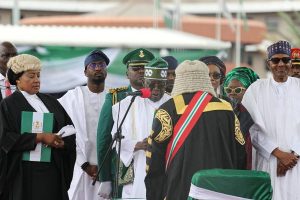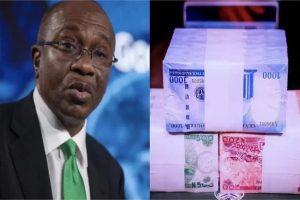Being conservative by nature, the Nigerian judiciary hardly grabs news headlines. But the 2023 general elections dragged it to the front pages for most part of the year, mostly for negative reasons. Many of its controversial judgments on electoral litigations, before and after the elections, drew public reactions that questioned its integrity.
The highpoint of it all was the Supreme Court judgment on the separate Presidential election petitions appeals filed by the closest rivals, Atiku Abubakar of the Peoples Democratic Party (PDP) and Peter Obi of Labour Party (LP) against the victory of President Bola Ahmed Tinubu of the All Progressives Congress (APC). For about two months, from early September, the nation waited with bated breath for the Supreme Court to finally decide the fate of the new President and that of his rivals who were challenging his victory.

The d-day came October 26 when the apex court affirmed the earlier judgment of the Presidential Election Petitions Court (PEPC) which had dismissed the petitions.
Atiku Abubakar and Peter Obi of the Labour Party, had alleged that the electoral commission failed to electronically transmit results from polling stations to an online portal. Abubakar and Obi who came in second and third, respectively, in the February 25 election, also argued that Tinubu had won less than 25% of the vote in the federal capital, Abuja, short of the legal threshold to become president.
Abubakar’s lawyers tried to submit evidence that Tinubu had forged academic credentials from an American university, but the Supreme Court rejected this, stating that it was not reflected in the original petition within the time frame provided by the Nigerian Constitution.
“Facts and documents which were not pleaded in the petition have no place in deciding the dispute between the parties,” Justice Inyang Okoro said.
The verdicts by the two courts drew outrage across the country, specially from the camps and supporters of the petitioners and civil society. They accused the courts of awarding the judgments to the highest bidder, claiming that the weight of the allegations, evidence and legal antecedents should have tilted the scale of justice in favour of the petitioners. They alleged that the courts were in cohorts with the Independent National Electoral Commission (INEC) and the ruling party, APC, to pervert justice and destroy the country’s electoral system and democracy.
The judgment by seven Supreme Court judges, which was final, followed a pattern seen in previous presidential elections that have been challenged in court. None of the attempts to overturn results through the courts has been successful.
“This judgment by the Supreme Court has evidently shaken the confidence of Nigerians in the judiciary, especially the Supreme Court as the last hope of the common man,” the PDP said.
But Tinubu hailed the judgement, saying the court had done justice to all issues put up for consideration in the petitions on the merits of the law, without fear or favour. “There is no doubt, with the profound judgment of today, that our electoral jurisprudence and constitutional democracy are further consolidated and embedded more indelibly in our national identity because of the diligence and undaunted professionalism of the Honourable Justices who presided over the matter,” he said.

He called for support from his opponents. “We are all members of one household, and this moment demands that we continue to work and build our country together,” Tinubu said in a statement.






